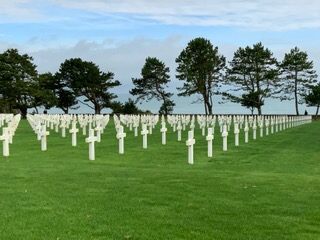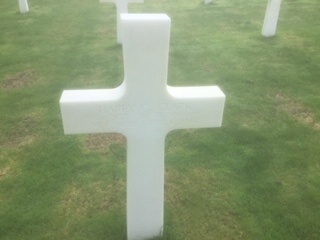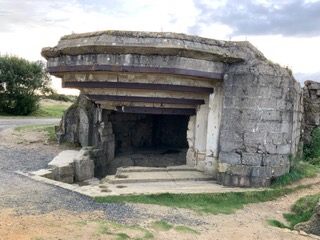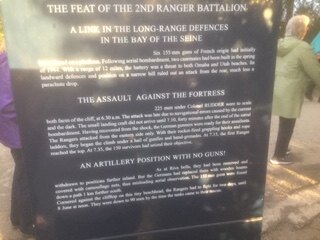Nick
Catalano is a TV writer/producer and Professor of Literature
and Music at Pace University. He reviews books and music for
several journals and is the author of Clifford
Brown: The Life and Art of the Legendary Jazz Trumpeter,
New York
Nights: Performing, Producing and Writing in Gotham
, A
New Yorker at Sea,, Tales
of a Hamptons Sailor and his most recent book,
Scribble
from the Apple. For Nick's reviews, visit his website:
www.nickcatalano.net
I am in Normandy
strolling among the dead in the American cemetery adjacent to
Omaha Beach. Seventy five years ago thousands of G.I.s came
here and died. As I move through the rows of gravestones on
an overcast day the silence is deafening. No one is here. I
gaze  painfully
at names on the graves and tears begin to well up in my eyes.
I ponder the numbers of the dead -- 9,388 soldiers are buried
here, 307 of them unknown. I think of their ages -- many youngsters
in their teens -- and I begin to sob. I randomly stop at a grave
and see a name -- Harry C. Clark, a fellow New Yorker in plot
H row 9 grave 30, a sergeant in the 747th Tank Battalion. Now
my sobbing deepens. I’ve been to
painfully
at names on the graves and tears begin to well up in my eyes.
I ponder the numbers of the dead -- 9,388 soldiers are buried
here, 307 of them unknown. I think of their ages -- many youngsters
in their teens -- and I begin to sob. I randomly stop at a grave
and see a name -- Harry C. Clark, a fellow New Yorker in plot
H row 9 grave 30, a sergeant in the 747th Tank Battalion. Now
my sobbing deepens. I’ve been to  Auschwitz,
lived through 9/11,written about both horrors while maintaining
my writer’s cool . . . but have never cried as hard or
as long as I can remember.
Auschwitz,
lived through 9/11,written about both horrors while maintaining
my writer’s cool . . . but have never cried as hard or
as long as I can remember.
Why is my sobbing so strong? I think about the soldiers buried
here mostly kids -- teenagers like the ones in my university
classes back home. These kids came here to fight Hitler and
most knew they would probably never come home. The soldiers
here had no agenda of imperialistic gain like other armies in
the miserable history of warfare. They were fighting for freedom
in the most honorable war effort in American history. As FDR
said “ . . . they fight not for the lust of battle. They
fight to end conquest. They fight to liberate. They fight to
let justice arise . . . They yearn but for the end of battle,
for their return to the haven of home . . . Some will never
return.”
I walk along the grass among the gravestones with Christian
crosses and Stars of David . . . the silence amplifies my gasps
and groans as I wipe away at the tears . . . and keep wondering
why I can’t stop whimpering . . . Maybe it’s because
all of this happened during the early years of my life . . .
maybe it’s because I know that so much of the sorrow of
75 years ago has been forgotten and that in another 75 years
it will become a dimmer blip in history. Maybe it’s because
all the films about Normandy enabled me to see soldiers faces
and hear their banter . . . it’s probably a combination
of all of this and also my horrible imaginings of what it must
have been like here as these youngsters died so violently by
the thousands.
I say a final goodbye to Harry C. Clark as I leave the cemetery
to move a short distance to Omaha Beach. I’m grieving
because I know that no one will ever write about Harry or mention
his name again . . .
On the beach I gaze across the Channel at the English coast.
I collect some beach sand as the waves lap against the shore.
I envision the LST’s at dawn on June 6th lowering their
bows and the soldiers jumping into the water as machine gun
fire from German bunkers slaughters many even before they can get onto land. As I walk
I can’t count all the bomb craters and artillery holes
that are still here from so long ago. I recall the words of
Colonel George Taylor,“ There are two kinds of people
who are staying on this beach: those who are dead and those
who are going to die. Now let’s get the hell out of here.”
I see the boys from the 1st and 29th American infantry divisions
crawling up the beach past Hitler’s Atlantic wall. The
broken and bloody bodies are flying everywhere as the ceaseless
mortar and machine gun fire rages on . . . New tears pour down
my cheeks.
slaughters many even before they can get onto land. As I walk
I can’t count all the bomb craters and artillery holes
that are still here from so long ago. I recall the words of
Colonel George Taylor,“ There are two kinds of people
who are staying on this beach: those who are dead and those
who are going to die. Now let’s get the hell out of here.”
I see the boys from the 1st and 29th American infantry divisions
crawling up the beach past Hitler’s Atlantic wall. The
broken and bloody bodies are flying everywhere as the ceaseless
mortar and machine gun fire rages on . . . New tears pour down
my cheeks.
I walk a short distance and look up at the 100 foot cliff of
Pointe du Hoc -- a  promontory
where the Germans had installed their mightiest 155 mm cannon,
alone capable of sinking allied ships and completely halting
invasion efforts. At dawn on June 6th 260 soldiers of the 2nd
Ranger Battalion had incredibly scampered up the cliff without
suffering a single casualty. At the top they discovered that
the gun had been dismantled and was useless -- one of the inevitable
ironies of D-day. Their jubilation was short because as they
moved inland during the afternoon of the next day the German
artillery mowed them down and most of them died.
promontory
where the Germans had installed their mightiest 155 mm cannon,
alone capable of sinking allied ships and completely halting
invasion efforts. At dawn on June 6th 260 soldiers of the 2nd
Ranger Battalion had incredibly scampered up the cliff without
suffering a single casualty. At the top they discovered that
the gun had been dismantled and was useless -- one of the inevitable
ironies of D-day. Their jubilation was short because as they
moved inland during the afternoon of the next day the German
artillery mowed them down and most of them died.
As I walk over to the American museum, I stop along the path
to see photos and written profiles of soldiers who died at Normandy
. I stare at the photos thinking of these youngsters who would
never live a full life, would never enjoy family and friends,
would never love or laugh at memories in old age.
As I move on to the other beaches -- Utah, Sword, Gold, and
Juno -- my depression deepens because I know most of the world
has already forgotten about these dead soldiers. Tragically,
as the years pass so much of important history evaporates in
the collective unconscious. This inevitable forgetfulness is
one of the factors that leads to further war and killing.

In
the next issue I will retrace some of the strategies and events
that enabled the Normandy landing to penetrate the Nazi war
machine. Of all America’s war involvements, some of which
have questionable motivation, it stands as the most notable
chapter in the nation’s efforts to help free the world
from tyranny.